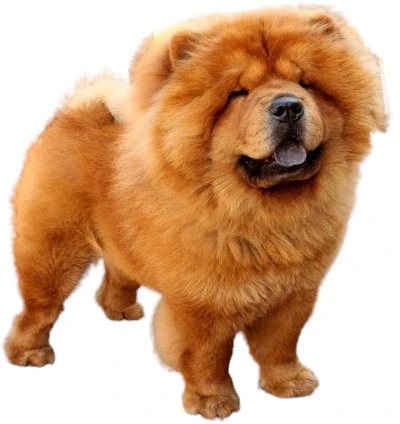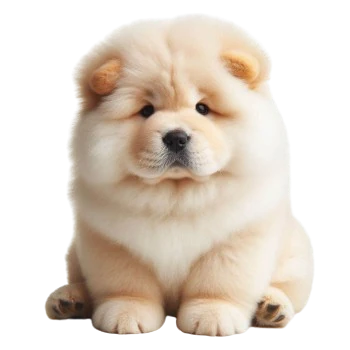
The Chow-Chow is a distinctive dog breed known for its unique appearance and particular personality. Originating from China, this breed is easily recognizable by its thick coat and blue tongue. Historically, the Chow-Chow was used for various tasks, including as a guard dog, sled dog, and hunting dog.
The Chow-Chow is a medium-sized dog with a robust build and a distinctive appearance. Its most notable feature is its dense coat, which forms a sort of mane around its neck, giving it a lion-like appearance. The head is broad and rounded, with small, deep-set eyes that convey great intelligence. The ears are small, upright, and set wide apart, while the tongue is a deep blue, a unique trait of the breed. The Chow-Chow has a muscular body with straight legs and a tail curled over its back.
The Chow-Chow typically stands between 46 and 56 cm at the shoulder, with a weight ranging from 20 to 32 kg. Males tend to be slightly larger and heavier than females. Its robust body and imposing stature give it a majestic presence.
The Chow-Chow is known for its double coat, which is thick and silky. The undercoat is dense and soft, while the topcoat is longer and straight. The coat can come in various colors, including black, red, blue, cream, and cinnamon. This breed requires regular grooming to prevent mats and tangles. Weekly brushing is recommended to maintain coat quality.
The Chow-Chow is known for its independent and reserved temperament. It is often described as having a dignified and stoic personality, which can make it somewhat aloof with strangers. However, it is generally very attached to its family and can be protective of its loved ones. The Chow-Chow is intelligent and can be quite stubborn, which may make training a bit challenging. It is important to start socialization and training from a young age to ensure balanced behavior.
The Chow-Chow is generally healthy but can be prone to certain health issues due to its particular build. Common problems include eye infections, skin disorders, and respiratory issues due to its dense coat. It is essential to monitor for signs of health problems and provide regular care, particularly for the eyes and skin. A balanced diet, regular veterinary visits, and moderate exercise are important for maintaining overall health.

The Chow-Chow Puppy is easily recognizable by its miniature lion-like appearance and unique blue tongue. Originally from China, the Chow-Chow is a calm and independent dog, yet deeply attached to its family. Though it tends to be reserved, it is loyal and protective. This puppy requires early socialization and a firm yet gentle training approach. Its thick coat, which can be either smooth or rough, needs regular grooming to prevent tangles and maintain its majestic look.
The price of a Chow-Chow Puppy generally ranges from 1500 to 3000 euros, depending on lineage, breeder, and the puppy's physical characteristics. It is important to go to a reputable breeder to ensure the puppy’s health. Future owners should also plan for additional expenses for veterinary care, vaccinations, and grooming to maintain this unique breed’s coat.
Training a Chow Chow can be challenging due to its independent and sometimes stubborn nature. However, with patience and the right approach, you can successfully train your Chow Chow. Here are some tips to help you achieve this.
Socialization: Socialization is crucial for a Chow Chow. Get them used to meeting other dogs, people, and various environments from a young age. This will help them become a balanced and less wary dog.
Positive Reinforcement: Use positive reinforcement to encourage good behaviors. Rewards such as treats or praise are very effective. Avoid harsh punishments that can make your Chow Chow even more stubborn.
Consistency: Be consistent in your rules and expectations. Chow Chows are intelligent but may test boundaries. Consistency is key to establishing lasting behaviors.
Exercise: Although Chow Chows are not the most energetic dogs, they need regular exercise to stay healthy. Daily walks and interactive games are essential for their well-being.
Patience: Training a Chow Chow requires a lot of patience. Their independent nature can make learning slower. Take the time to gain their trust and reassure them.
By following these tips, you can effectively train your Chow Chow and build a strong bond with them.